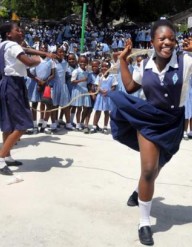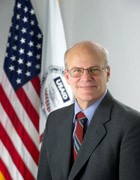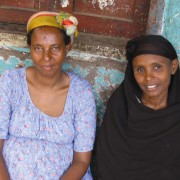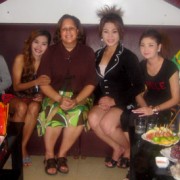FrontLines: The issue of women and girls is near and dear to your heart. Can you talk a little bit about your personal experiences that have led you to be such a champion of women's issues and women's empowerment?
Don Steinberg: It began with my very first assignment with the Foreign Service. I was 22 years old and was sent to the Central African Republic. One of my first tasks was to help put together a rural health project in the Ouham region.
We started out by going to the region and talking to the health providers, who were nearly all women, and to average citizens. After a lengthy process of drawing on their wisdom, we put together a project that focused on mother-child health care, immunization, and water and sanitation.
By the time I left the Central African Republic two years later, we could already see declines in infant and maternal mortality, as well as a new sense of empowerment for women who were at the center of this project. And realizing that my contributions in part had helped spark that change and had helped women and kids thrive, I was hooked.
FL: So why women, specifically? What happens when you invest in a woman in the development context?
DS: It's important for so many reasons. First of all, we have the opportunity to draw on the talents, insights, and institutional knowledge of half the population that has been traditionally excluded from project design and implementation.
But there's a special role for women in key development areas, including President Obama's top development initiatives. On the Global Health Initiative, women are at the center of improving health standards and incorporating new health practices into their families and communities. In terms of the Feed the Future initiative, women represent some 70 percent of the producers of food, and, thus, empowering women is key to introducing new agricultural techniques and a new market-oriented focus on value chains. The same can be said of adaptation and remediation efforts for climate change, promotion of governance and democracy, crisis response, and economic growth.
FL: Can you point to a specific example of where USAID is innovating in its approach to women-centered policies?
DS: One practical example is the introduction of new fuel-efficient cooking equipment and methods. Especially in Africa, we are relying on women to move away from traditional dependence on charcoal, which has a devastating impact on the environment through deforestation, causes severe respiratory problems, and draws labor away from more productive uses. Solar cookers or other new forms of food preparation have the potential to encourage fundamental change in these societies and economies.
FL: In your experience, what is the benefit of involving women in post-conflict resolution? And where has this been done particularly well?
DS: The systematic exclusion of women from the negotiation of peace agreements and implementing bodies is one of the key reasons why so many of these agreements ultimately fail and countries return to conflict. Involving women means that a broad range of issues that are important to the population are addressed, such as accountability for past abuses, psycho-social support for victims of violence, restoration of health and educational systems, reintegration of displaced persons and refugees, and trafficking in persons. All of these issues tend to be ignored when it's simply the men with the guns who are sitting around the table negotiating or engaging in the peace implementation body.
Secondly, women bring ground truth to a process. The men involved in the armed conflict don't have the same sense as to the social and reconstruction needs as women who have remained in their societies who have seen the impact of conflict and recognize the difficulty of demobilizing soldiers returning them to their communities.
Perhaps most importantly, involving women builds public and civil-society support for a peace process. In too many peace processes, once the momentum for political unification or military disengagement starts to wane, popular support is insufficient to see it through to the end.
The men with the guns have to end the war, but society as a whole—and, in particular, women—must build the peace.
FL: In the Arab world, and even more specifically, in countries where our development efforts coincide with a military presence—Iraq and Afghanistan—some argue that a foreign-imposed model promoting women's liberation actually negatively impacts genuine nationally borne women's movements. Do you see any truth in this at all? How carefully do we have to tread?
DS: It really depends on how you promote gender consideration. If women's equality and women's rights are presented as an external western model that outsiders are trying to impose on another country, then it is inappropriate. But that's not what I see in most of these situations.
Take Afghanistan and Iraq. Those societies traditionally have had a very important role for women, whether it's in the economy of those countries, whether it's in local conflict resolution, whether it's in political life. The exclusion of women from these sectors is an aberration that was brought in by the Taliban and some very conservative leaders. It is not consistent with the traditions of Afghanistan. Further, all countries have signed the basic international human rights conventions, and thus have committed to promote women's rights, empowerment, and participation. They themselves recognize that drawing on the full participation of women is vital for their political, economic, and social consolidation.
Most important is drawing on the expertise of the local women themselves. If you are guided by the wisdom and the vision of women in the country, it's very hard to go wrong. The guiding vision must be, "Nothing about them without them." When I was the U.S. ambassador to Angola, women activists would often courageously speak out on behalf of universal human rights and redress of past grievances. Whenever that would occur, I would quietly call them and say, do you want to come to the American mission for a meeting and take a picture with me? In essence, do you want to wrap the American flag around you so that everyone knows that if you mess around with this woman, you're messing around with the U.S. government? Or do you want me to stand back and stay as far away from you as I can because that would be dangerous for you?
And I would always be guided by their actions. Some would say, "Yes, I want the picture." Others would say, "Thanks, but let's pretend this phone call never even happened." So again, to be guided by their rules was the best approach.
FL: There have been recent academic challenges to the benefits of education programming in development. Can you offer a counterargument to those who say we should not be investing in education, and in the education of girls, specifically?
DS: Academics and researchers may quibble on the edges, but the vast preponderance of analytical as well as anecdotal evidence shows that there are few better investments you can make in development than girls' education, health, food security, and social empowerment.
FL: In your three decades of development work, do you have a project or achievement that you are most proud of?
DS: I was quite honored to serve over the past year or so on the U.N. Secretary General's Civil Society Advisory Group for Women, Peace and Security. This group was led by Mary Robinson, the former U.N. high commissioner for human rights, and Bineta Diop, who was the head of Femmes Africa Solidarité, and included a dozen activists and experts on women and armed conflict.
Basically, the group was asked by the secretary general to come up with concrete, time-bound, and measurable actions to reinvigorate global efforts to implement U.N. Security Council Resolution 1325. This resolution, passed in October 2000, identified dozens of steps that the international community should take to empower and protect women and girls in the context of armed context, and ensure their full participation in peace negotiations and post conflict reconstruction and governance.
Our advisory group put together practical actions, supported by financial resources, to address sexual violence against women displaced by war, to expand livelihood and educational opportunities for women and girls, to train peacekeepers and military forces on gender issues and hold them accountable for abuses, to enhance reproductive health care for women in emergency situations, to bring more women to the peace table, and so on. We also highlighted the need to assist the new agency, U.N. Women, to provide global leadership in these areas under the guidance of the talented Michelle Bachelet.
I welcomed the decision of Secretary of State Hillary Rodham Clinton to announce in October that the United States would prepare its own national action plan to implement 1325, an effort that is being led by the indefatigable Ambassador Melanne Verveer at the State Department with very strong USAID support. (See "U.S. Moves to Fulfill U.N. Resolution on Women, Peace, and Security.")
FL: USAID just launched its Counter-Trafficking-in-Persons Code of Conduct. What do you hope this initiative will achieve?
DS: This code of conduct puts USAID on record as taking a number of key steps to address the problem of trafficking in persons, which President Obama has described as a form of modern slavery. The code establishes ground rules for not only our programming, but our own actions in the field as well as those of our partners and our project implementers. It essentially says that we will both talk the talk in terms of supporting anti-trafficking programs around the world, but also walk the walk internally. We'll do this by establishing clear standards for the behavior of both AID employees and the people we support.
FL: What do you see as the greatest challenge facing women in the developing world today?
DS: The toughest challenge is to overcome the stigma of victimization that bedevils this whole field. Too many programs and projects in this arena categorize women as victims, rather than the key actors in addressing conflict and development challenges. And to speak frankly, too frequently, women themselves embrace that victimhood. To address this, we are establishing a four-pillar approach to gender considerations at USAID.
The first pillar is ensuring that gender is mainstreamed and integrated in all our development work, and in particular, food security, global health, and global climate change.
Second, we are focusing on women's empowerment in political, economic, and social terms. This means not only supporting women's political caucuses, girls' education, or mother-child health projects in countries, but taking these projects to scale around the world.
So it's not just a question of working with individual schools in Liberia to ensure that they are free from sexual abuse and provide safe areas for girls who are menstruating, but it means working with education and health ministers around the world to create systems to ensure that such schools are the norm. This involves a focus on partnerships where we can be working with private companies, international NGOs, host governments, international organizations, and, most importantly, women themselves in developing countries to take good projects at the grassroots level and bring them to scale on a global basis.
A third area is protection and participation. This effort involves prioritizing issues related to women's participation in peace processes, preventing and responding to sexual violence in armed conflict situations, implementing U.N. Security Council Resolution 1325, and engaging in anti-trafficking programs.
The fourth pillar is walking the walk in-house, ensuring that USAID is a leader in women's empowerment in our system. We need to make sure that women are recruited for entry into the Civil and Foreign Service, empowered to fully contribute to our development mission, given opportunities through mentorships, treated fairly in the promotion/evaluation/assignment processes, and challenged to lead our agency.
FL: I know you were heavily involved with the QDDR (State Department-led Quadrennial Diplomacy and Development Review) process. As USAID undergoes its reform process within the greater context of the QDDR, where do you hope this agency will be in 10 years, in 20 years?
DS: I believe that we are seeing now the most concerted support within the administration for USAID's empowerment that we've seen since the organization was established in 1961. We have clear statements from President Obama in his presidential policy directive on development—the first time any president has ever issued a directive on development—and from Secretary Clinton in the QDDR that they view development as a key to our national security and economic interests—and that they view AID's empowerment as key to achieving development.
We have embraced that through the USAID Forward program. So I see USAID's future as an agency that is fully incorporating science and technology into everything we do; an agency that is a thought leader on development issues, whether it's the youth bulge, water, education for the 21st century, or countering violent extremism; and an agency that develops its own budget and sets priorities in line with the president's vision. I see USAID as a partner in an interagency context, and, in many cases, as an inclusive leader: one that sets the agenda, that is accountable for results, that has clear metrics for monitoring and evaluation, and that fully values the contributions of other U.S. government agencies, as well as those of the private sector, civil society, other foreign donors, and international organizations.
FL: If you could address all of them right now, what would your advice be for new members of Congress who might be skeptical about the value of foreign assistance?
DS: The money we spend on foreign assistance represents the best investment we could possibly make in our national security, in our national economic interest, and in promotion of our values.
For less than 1 percent of our federal budget, we are encouraging development around the world that will keep countries from descending into instability, where we would have to send American troops. It keeps societies from trafficking in women, in drugs, in arms. It keeps societies from spinning off huge numbers of refugees and illegal migrants. It keeps societies from being the breeding grounds for terrorists or for pandemic diseases.
Development is also in our national economic interest. Developing countries are also going to be the key to our economic prosperity in the future, given that this is where most of the new growth in external markets is going to occur, and, thus, the opportunity for American business to export and generate jobs for Americans.
Finally, development assistance is the best investment we can make in creating the kind of world we want to live in, a world that's prosperous, a world that's democratic and respectful of human rights, a world that's peaceful.












Comment
Make a general inquiry or suggest an improvement.